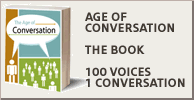
An event hosted by the always energetic and inspiring David Kirkpatrick.
David and his Fortune crew had managed to bring together an incredible group of people for Day 2; including; Esther Dyson, Chris De Wolfe of MySpace,, Vince Cerf of Google. Michael Jackson of IAC, Bruno Wu of Sun Media, Terry McBride of Nettwerk Music, Mitchell Baker of Mozilla, Shane Robison CTO of HP, Rob Glaser of Real Networks, Jimmy Wales founder of Wikipedia and Mark Hurd CEO of HP.
On Day 1, Richard Dawkins, the father of the “meme” spoke, quite a coup.
Some of the most interesting conversations on Day 2 revolved around the challenges of corporate culture, social networking and the increasing power of users.
The Challenge of Corporate Cultures
It was widely recognized and discussed that culture is one of the biggest challenges facing incumbents and companies that are on fast growth tracks. The bigger you are, the harder it gets to be disruptive.
Collaboration and acquisition are potential solutions around this problem. There was also Cisco’s John Chambers who wowed everyone on Day 1, with his radical solution; invert the corporate pyramid.
Some other soundbites on the topic:
“To talk to anyone at Google these days, you need to talk to 2 PR people who are likely to say “no”, just because they need to be seen to be doing their job”
David Kirkpatrick
“The majority of the smart people in the world don’t work for you.”
Bill Joy (Day 1)
“The most important thing for large organizations, is to get out of the way of themselves”
Micheal Jackson- IAC
“My Space is too busy building 10 new features, to be disruptive.”
Chris De Wolfe-My Space
Social Networks and User Power
Huge themes, massively disruptive and incredibly powerful; UGC is redefining the meaning of media, social networks have the power to change the commerce model and to undermine advertising. There’s a desire for consumers to be active participants; they want to go beyond consumption.
Social networks already have the power to allow users to share ideas about new products, new music, etc and it's just a matter of 6-12 months before they become commerce enabled. Users will be able to transact and converse all within their social network. Network members will also become recommenders and might even get compensated if their reommendation leads to a transaction (difficult area!).
Shane Robison of HP referenced Second Life as an interesting example of how commerce was developing at a peer-2-peer level.
Nettwek Music's Terry McBride explained how his company was using fans to do a lot of the promotional heavy lifting and grassroots marketing, that record companies no longer had the bandwidth to accomplish. One of his bands now has 100,000 fans in its national street team network.
Mitchell Baker of The Mozilla Foundation (the folks behind Firefox) explained how its community is the most important thing. Mozilla is an open-source organization generating annual revenues of $60 million with the help of 10,000 volunteers. The importance of making your community the No 1 priority was echoed by Wikipedia founder Jimmy Wales.
Overall, Day 2 of imeme was a reminder of the incredible impact the web, but, of course, it wasn’t a conference about the past, the message I took away is that we haven’t seen anything yet. Get ready for more disruption, more participation, more legislative challenges and more threats on our identity and security.
Posted by Ed Cotton
It appears you don't have Flash installed.
